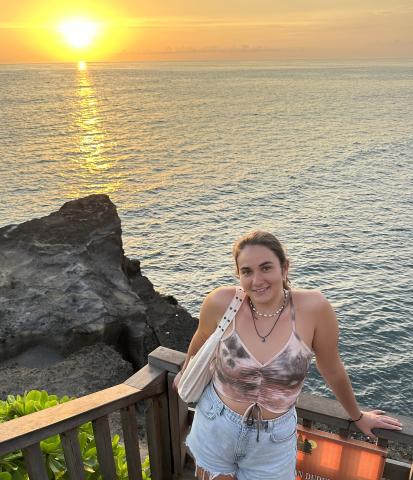Stephanie O'Connor
University of Melbourne, Australia

Biography
How did studying abroad affect your academic and/or professional career?
Going to Australia allowed me to take classes that Tulane does not offer, such as Aboriginal History and Controversies in Australian History, furthering my enrichment in courses outside of my major. I was also able to take psychology classes that taught me how to use programs like ANOVA, which is extremely relevant in the field of psychology.
How did you explore your hobbies, interests, and passions abroad?
During my time abroad I had plenty of opportunities to travel and experience nature. In the area surrounding Melbourne there are so many different landscapes to explore, and being able to go on all of these road trips has fostered my love for the outdoors. I was able to climb to the top of volcanoes in New Zealand and watch the sunrise from above the clouds in Indonesia. I am extremely interested in history, so being in Australia allowed me to learn more about the Indigenous Australians and their rich history. My travels through southeast Asia gave me the opportunity to learn so much about a region of the world that has been largely overlooked in any history class I've taken.
Why would you recommend your respective abroad program or location?
I would highly recommend the University of Melbourne because they have plenty of resources for exchange students, which means plenty of opportunities to meet other study abroad students and become immersed in Australian culture. You live right in the middle of the city, convenient to museums, libraries, public parks, and a range of activities that are right outside your front door. Not only do you get the experience of a city dweller, you have nature reserves and public parks surrounding the city, exposing you to a whole different side of Australia. Furthermore, Australia has a unique location that enables you to travel to a region of the world you would typically not go to on your own.
What should students consider when applying and preparing for their time abroad?
When applying for your time abroad, I think it is important to consider what you hope to gain out of your experience. If you crave finding independence and want to become comfortable with change, you might want to choose destinations that force you out of your comfort zone. If studying abroad means furthering your professional career, you might want to select universities that have respectable programs for your major. When preparing for your time abroad, it is extremely important to engage in research on the culture for which you wish to immerse yourself in. For those who feel nervous about going abroad, I found it very helpful to write letters to my future self to provide some emotional support.
Did your identity impact your study abroad experience?
Being an American and only being fluent in English definitely impacted my time abroad. Most of the international students I was friends with knew two or even three languages, which has inspired me to work towards becoming fluent in another language. It was also fascinating to understand how people of other nationalities viewed Americans.
Share a story about a time you experienced cultural immersion.
In the state of Victoria, footy is one of the most popular sports. In fact, it is so popular that most people have a day off from school or work for the final match. It is a mixture of football, soccer, and rugby, and is played on a cricket field. I was able to get nearly front row seats to one of the games and learn about all of the rules from the friendly security guards. Although fans going crazy for a sport sounds very American, it felt completely different to experience it with Australians for a sport that I had never even heard of before.
